William Sherard to Hans Sloane – March 28, 1699
Item info
Date: March 28, 1699 Author: William Sherard Recipient: Hans SloaneLibrary: British Library, London Manuscript: Sloane MS 4037 Folio: ff. 237-238
-
Language
English
-
Library
British Library, London
-
Categories
Library, Royal Society, Scholarship, Travel
-
Subjects
Books, Italy
-
Date (as written)
March 28, 1699
-
Standardised date
-
Origin (as written)
Rome
-
Others mentioned
Captain Hatton Charles Spencer Venetian Consul
-
Patients mentioned
Original Page

Transcription
[fol. 238] Dear Sr. Ime glad to hear in came safe to hand, but am sorry yrs wherein you took ye pains to give me an acct of wch books you had disposed of is Cost, tis ye 6th that has miscarrie in a few moths last past, the inclos’d I read lately from naples, to be forwarded to you, being I suppose a list of ye books sent you by Mr Buliston, probably severall wch I have bought for you there. I wonder ye ship is not yet arrived by wch I sent some from theusa abve 4 months past. I have sent 2 large Bales wch are got safe to Legorn, & I hope will be ship’d speadily for Londn. there is in them severall of yr notes, others for Ld Spencer, Capt. Hatton & I have yet another to send of unfound books. there’s nothing new here but Fabrettis inscriptions, P. Bonanni’s Hist. of St. Peters by ye popas medically & Saffonis observations uopon ye voiabularis della Bruica, all wch I have bought. sigre Fabretti gave me all his Etruscan inscriptions & explanations to be presented to ye Royall society & in return I gave him one of ye magnighis; ye others were disposed of to sigre Bagdir, Battoni, Bociona, Prnce della Catholica, Triusufetti, nazari & two I keep for viviani & magliabealis, wch was all I had. ye consul writes me from Venice he has given you an acct. of ye vast P. Cupani is printing Hortus Cathelicus some suis supplamentis austus expargatus [fol.238v] et Coinplatatus cum indiculis Andualuis colefrium tanaghicus et marinorium in Siulia degeuticus. I sent a surious parcel of seeds I had from him to Engld some months since & I hope they’ll come time enough for this season. we shall stay here to see ye holy week & then move by way of Florence, Bolonia Mulan & Turin towards France, where I hope to be by ye end of June. if you’ll fling away so much time as to let me hear from you, be pleased to direct to Signre Flaudio Jamieau nagotiante Francesa venatio, afterwards I shall be glad to meet yr commands in France & shall give you directions assoon as [?] correspondence is settled there. we have here ye queed of Poland & yt Card. her father, ye Daha of Berwick log’d at Lord. Bullius imognito; & I plymeath & severall Pugish Gent from Venice. give my service to all friends st ye Clubb & else where & give me leave to confirm my self, Sr Rome March 28 1699 yr most obliged humble Servt. WSherard
Sherard was a botanist and cataloguer. He worked for the Turkish Company at Smyrna where he collected botanical specimens and antiques (D. E. Allen, Sherard, William (16591728), Oxford Dictionary of National Biography, Oxford University Press, 2004; online edn, Jan 2008 [http://www.oxforddnb.com/view/article/25355, accessed 24 June 2011]).
Patient Details
-
Patient info
Name: N/A
Gender:
Age: -
Description
-
Diagnosis
-
Treatment
Previous Treatment:
Ongoing Treatment:
Response: -
More information
-
Medical problem reference









